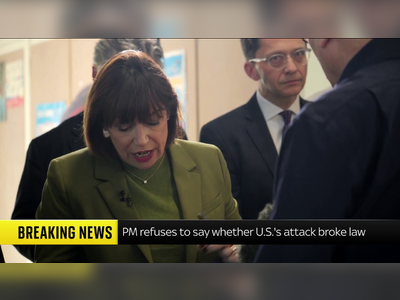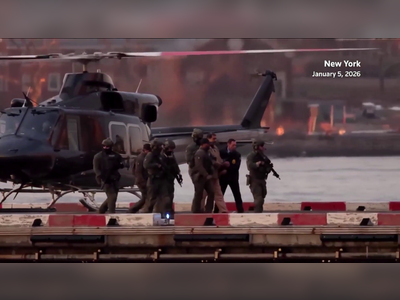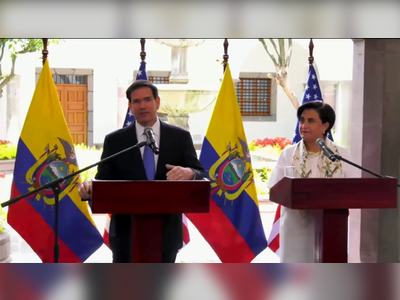
US Secretary of State Meets Panama Leader Over Trump's Demand for Canal
Marco Rubio's diplomatic mission in Panama seeks to address President Trump's demand to reclaim control of the Panama Canal, but faces strong opposition from Panama's leadership.
US Secretary of State Marco Rubio held talks with Panama's President Jose Raul Mulino on Sunday, seeking to address President Donald Trump's demand for the United States to regain control of the Panama Canal.
Trump has refused to back down from his assertion that the canal, handed back to Panama in 1999, should be returned to US control.
The talks took place amidst growing tensions over the canal’s strategic importance, particularly concerning Chinese influence in the region.
Rubio, on his first diplomatic visit abroad as Secretary of State, met with Mulino at the Panamanian leader’s official residence.
Following the meeting, Rubio was scheduled to tour the Panama Canal, which remains a critical maritime link for US container traffic, with approximately 40% of such traffic passing through it.
Rubio and Trump have voiced concerns that China’s growing presence around the canal could pose a risk to US national security, particularly in the event of a conflict.
In response to US pressure, Panama has initiated an audit of a Hong Kong-based company controlling canal-adjacent ports.
However, Trump has dismissed these efforts, claiming that Panama has not fully honored the original agreement made during the handover of the canal in 1999. Trump further argued that Panama’s actions are a violation of the terms established in the treaty.
Protests in Panama erupted ahead of Rubio’s visit, with demonstrators burning an effigy of the US Secretary of State.
Protesters expressed their strong opposition to any potential erosion of Panama's sovereignty, with local academic Diojenes Sanchez condemning the US claims and vowing to defend Panama’s independence.
The Panama Canal was originally constructed by the United States, opening in 1914 and operating under US control until its transfer to Panama in 1999, following years of negotiations after riots in 1964. The 1999 handover, facilitated by US President Jimmy Carter, was seen as a move to restore Panama’s sovereignty.
In contrast, President Trump’s rhetoric signals a shift towards a more assertive stance, reminiscent of early 20th-century US foreign policy in Latin America.
During his visit, Rubio also emphasized the broader US agenda of addressing migration issues in the region.
Rubio’s trip includes visits to El Salvador, Costa Rica, Guatemala, and the Dominican Republic, where he is expected to urge cooperation on deporting migrants to the United States.
Trump has refused to back down from his assertion that the canal, handed back to Panama in 1999, should be returned to US control.
The talks took place amidst growing tensions over the canal’s strategic importance, particularly concerning Chinese influence in the region.
Rubio, on his first diplomatic visit abroad as Secretary of State, met with Mulino at the Panamanian leader’s official residence.
Following the meeting, Rubio was scheduled to tour the Panama Canal, which remains a critical maritime link for US container traffic, with approximately 40% of such traffic passing through it.
Rubio and Trump have voiced concerns that China’s growing presence around the canal could pose a risk to US national security, particularly in the event of a conflict.
In response to US pressure, Panama has initiated an audit of a Hong Kong-based company controlling canal-adjacent ports.
However, Trump has dismissed these efforts, claiming that Panama has not fully honored the original agreement made during the handover of the canal in 1999. Trump further argued that Panama’s actions are a violation of the terms established in the treaty.
Protests in Panama erupted ahead of Rubio’s visit, with demonstrators burning an effigy of the US Secretary of State.
Protesters expressed their strong opposition to any potential erosion of Panama's sovereignty, with local academic Diojenes Sanchez condemning the US claims and vowing to defend Panama’s independence.
The Panama Canal was originally constructed by the United States, opening in 1914 and operating under US control until its transfer to Panama in 1999, following years of negotiations after riots in 1964. The 1999 handover, facilitated by US President Jimmy Carter, was seen as a move to restore Panama’s sovereignty.
In contrast, President Trump’s rhetoric signals a shift towards a more assertive stance, reminiscent of early 20th-century US foreign policy in Latin America.
During his visit, Rubio also emphasized the broader US agenda of addressing migration issues in the region.
Rubio’s trip includes visits to El Salvador, Costa Rica, Guatemala, and the Dominican Republic, where he is expected to urge cooperation on deporting migrants to the United States.











